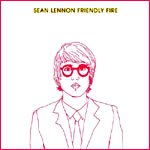So it's been eight years since the release of Sean Lennon's debut album Into The Sun, has it? Here I was, planning an investigative report into the disappearance of Grand Royal's little-singer-that-could, and along comes Friendly Fire, Lennon's first release of the new millennium. Just when I was beginning to think Sean was going to crap out on us and not bother releasing anything on a large enough scale to be noticed, he gives us another light pop record with lots of harmony and soft vocals. The difference is that this time the man isn't smiling on the cover, as he was with his whimsically breezy debut.
But perhaps that's not a bad thing. A lot of not-so-great things have happened since that bright smile was sketched onto the cover of Into The Sun. His label, Beastie Boys' Grand Royal, dissolved, and Lennon found himself in a similar circumstance with his relationship (his girlfriend cheated on him with his best friend, who died later in a motorcycle accident). But the boy is clever about his misfortunes, shaping them into cheeky, schoolyard bully lyrics, such as on "Dead Meat": "Dead meat/ Don't you know you're dead meat/ You just messed with the wrong team/ Better not try and fall asleep".
Friendly Fire has a sound and feel to it reminiscent of a now-deceased singer/songwriter beloved by many, many music fans across the globe. No, not him — Elliott Smith, actually. Many of the songs on Sean's latest draw from the strengths of Smith's more polished work, like 2000’s Figure 8. The two have many similarities: they both share a gentle, inviting vocal delivery and create pretty ballads that channel their pain via choruses à la The Beach Boys or The Byrds — take the pure pop perfection of Lennon's "Parachute," for example.
While others accuse Lennon of being lazy or living a "rich kid's holiday" (though the man this quote is attributed to wrote liner notes for Kim Carnes and John Waite, and thinks The Beatles' best song is "She's A Woman"), the charm of his songs exists in their modesty. They are simple, direct, honest, gentle, well-written, and catchy. Lennon isn't attempting to re-invent the wheel with Friendly Fire; he's just writing a narrative using thoroughly enjoyable pop melodies.
The appearance of talented collaborators doesn't hurt, either — Vincent Gallo, Yoko Ono, Money Mark, Jon Brion, and former lovers Yuka Honda and Bijou Phillips all contribute to an album that begs jaded music critics to insult it, yet also invites the interested listener to pursue it further. It's a refreshing listen for those of us who are tired of hearing all about The Hold Steady and how great they are. Ultimately, eight years is still far too long to wait for an artist to release a new record, but Friendly Fire shows that it can be worth it, if you're willing to slow down and listen for a moment.
More about: Sean Lennon




